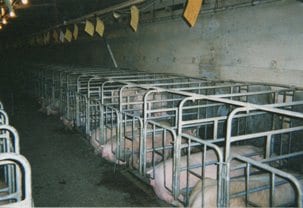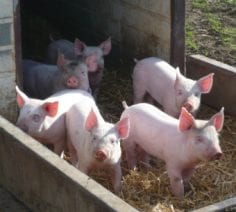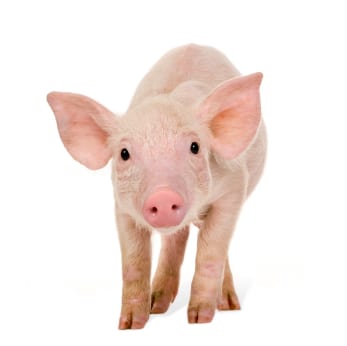Imagine living your life confined to an airline seat. According to world-renowned animal welfare expert Dr. Temple Grandin this is what it’s like to be a pregnant pig in Canada today.
Pigs are intelligent, social animals – they’re at least as smart as dogs, and like their wild relatives, pigs love to explore and “root” around. Yet pigs raised on Canadian farms are normally kept inside on concrete floors, with females kept in confining stalls that cause great stress and frustration.
 Female pigs spend most of their lives – about three years – in metal stalls approximately two feet wide by seven feet long. Sows can lie down and get up, but can never turn around. First introduced in the 1950s, these gestation stalls are barren and uncomfortable for the sow, but highly efficient for feeding, cleaning and preventing aggression between pigs. However, we know from published research that farmers can achieve equal or better productivity and health in group-housing systems provided that they are well-designed and managed.
Female pigs spend most of their lives – about three years – in metal stalls approximately two feet wide by seven feet long. Sows can lie down and get up, but can never turn around. First introduced in the 1950s, these gestation stalls are barren and uncomfortable for the sow, but highly efficient for feeding, cleaning and preventing aggression between pigs. However, we know from published research that farmers can achieve equal or better productivity and health in group-housing systems provided that they are well-designed and managed.
The scientific facts of pig welfare have caught the attention of big brands like Tim Hortons, McDonald’s and Maple Leaf. A growing number of retailers are adding animal welfare to their sustainability agendas and responding to the mounting pressure to ensure meat products are raised under more humane conditions. In recent years at least 30 food processors, grocery retailers and restaurant chains have pledged to eliminate gestation stalls from their supply chains. Most recently, Canada’s largest grocery retailers including Loblaw, Safeway, Sobeys, Costco and Walmart committed to sourcing pork raised in alternative housing systems as defined in Canada’s updated Code of Practice for the Care and Handling of Pigs – the Pig Code.
 Animal welfare commitments from retailers are a powerful backdrop to the process underway to update Canada’s Pig Code. The Pig Code – last updated in 1993 – sets out Canada’s minimum standards for pig welfare through a stakeholder policy process steered by the National Farm Animal Care Council (NFACC). The BC SPCA represents animal welfare NGOs in this process, on behalf of our national partner agency, the Canadian Federation of Humane Societies (CFHS). Once it’s finalized, the Pig Code will serve as a reference standard for animal cruelty laws, setting out generally accepted practices of animal management, and it will form the foundation of on-farm assurance programs.
Animal welfare commitments from retailers are a powerful backdrop to the process underway to update Canada’s Pig Code. The Pig Code – last updated in 1993 – sets out Canada’s minimum standards for pig welfare through a stakeholder policy process steered by the National Farm Animal Care Council (NFACC). The BC SPCA represents animal welfare NGOs in this process, on behalf of our national partner agency, the Canadian Federation of Humane Societies (CFHS). Once it’s finalized, the Pig Code will serve as a reference standard for animal cruelty laws, setting out generally accepted practices of animal management, and it will form the foundation of on-farm assurance programs.
A draft of the new Pig Code is available for public comment beginning June 1. For the next 60 days, farmers, animal welfare interest groups and citizens are all invited to weigh in on the issues that matter most to them. At minimum, the animal welfare community wants to see a definitive move away from gestation stalls. Pain control for procedures like castration and less barren housing for all pigs are also critical to ensure that the food animals in our care are treated as humanely as possible.
In Europe, pressure from the animal welfare community has led to an overhaul of intensive confinement practices on pig farms over the last decade. Canada and the U.S., however, are years behind.
In Canada, demand for pork has dropped 24 per cent over the last decade. Canada currently exports 70 per cent of its pork, primarily to the U.S., and producers are also exploring markets in Europe and China. A new and progressive Pig Code in Canada may guard against animal welfare-related trade restrictions to European markets, and from an animal welfare perspective it will also ensure that the growing Asian demand for meat will be supplied by farms meeting higher standards than those countries might demand.
For B.C. consumers who want to purchase pork from farms accountable to higher standards, there is an option. The BC SPCA has five member farms producing SPCA Certified pork products. On SPCA Certified farms, gestation stalls are not permitted and comfortable bedding and more space is required for all pigs. However, the majority of pork comes from pig barns that rely on confinement housing systems to keep costs low for producers and prices low for consumers demanding cheap meat.
It is critical for the animals’ well-being and also key to the future sustainability of the industry that members of the public voice their expectations for pig farming in Canada. It’s time for Canada to align with other progressive nations and phase out confinement housing and other stressful and painful practices that impact the lives of the 27 million pigs raised each year in Canada.
Visit spca.bc.ca/farm find information on SPCA Certified products and learn more about the BC SPCA’s work to improve welfare standards for farm animals.

